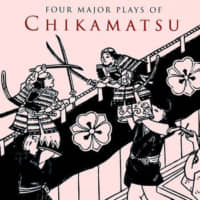Chikamatsu Monzaemon (1653-1725) has been called Japan's Shakespeare. Translator Donald Keene argues, however, that the genius of Chikamatsu is not that he was a "second Shakespeare," but that his plays are "the first mature tragedies (written) about the common man."
Four Major Plays of Chikamatsu, by Chikamatsu Monzaemon Translated by Donald Keene.
220 pages
COLUMBIA UNIVERSITY PRESS, Classic.
Chikamatsu wrote bunraku, Japan's traditional puppet plays. His works portray hardship and tragedy in the lives of ordinary people; themes include the conflict between giri (social obligation) and ninjō (human nature). Chikamatsu depicts this quandary as unrequited love in three of the plays. One, "The Uprooted Pine" (1718), ends happily. Two, "The Love Suicides at Sonezaki" (1703) and "The Love Suicides at Amijima" (1720), have titles with built-in spoilers.
"The Battles of Coxinga" (1715), by comparison, is based upon the Manchu conquest of China in 1644. The hero, Coxinga, is a young man of Sino-Japanese parentage who leads a heroic resistance against the Manchu in support of the Ming dynasty. Japan is described as a land of divine beings and mighty warriors, perhaps reflecting an embryonic nationalism that would come into its own when Japan began to transform itself into a modern nation-state 150 years later.
"Four Major Plays of Chikamatsu" provides a compelling and informative example of the popular culture of the Edo Period (1603-1868). With stories that are both distinctly Japanese and humanly universal, the characters' foibles, angst, desires and resolve reach and resonate with the reader across three centuries.

















With your current subscription plan you can comment on stories. However, before writing your first comment, please create a display name in the Profile section of your subscriber account page.